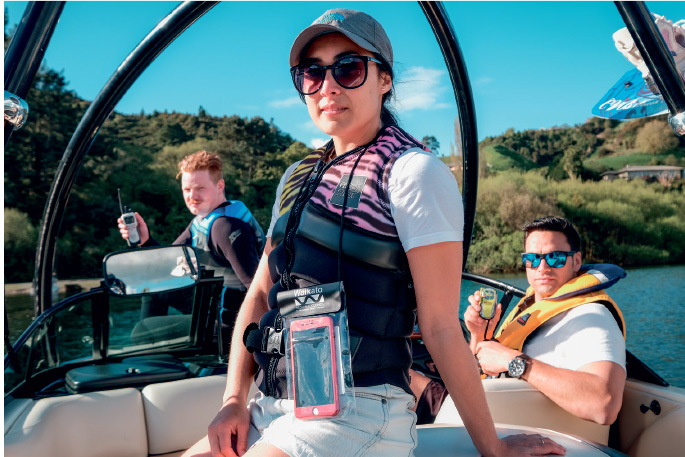Wearing a lifejacket helps prevent drowning, but if you can’t call for help then no one can rescue you.
Waterproof communication tools are one of the most essential things to take boating to increase your chances of survival when faced with an on-water incident. If you can attach your communication tools to your lifejacket, so they’re worn at all times, that’s even better!
Learn what type of communications are best suited for coastal or inland waterways, and make sure you are carrying at least two suitable forms while you’re out boating this summer.
Communication tools
Marine VHF radio
A waterproof VHF radio is the most reliable way to call for help when out in coastal waters, but only if you know how to use it. The biggest advantage is everyone tuned to channel 16 can hear your call for help, especially Coastguard and Maritime Radio.However, VHF may not always be suitable for inland rivers and lakes because of limited radio coverage.
Any person operating a maritime VHF radio must hold, as a minimum requirement, a Maritime VHF Radio Operator Certificate (unless transmitting in an emergency or a distress situation on channel 16). Certification is available through Coastguard Boating Education. See boatingeducation.org.nz or call 0800 40 80 90 for more information.
For VHF channels, check the MarineMate app or visit waikatoregion.govt.nz/maritime-services.
Cellphone in a dry bag
Cellphones are rarely designed to be waterproof, so keep yours in a sealed waterproof bag that you can still use if you are in the water. Remember, not all locations have cellphone coverage, particularly remote lakes and rivers, so make sure to take another form of communication that will work.
Distress beacons
EPIRBs (emergency position-indicating radio beacon) and PLBs (personal locator beacons) are the most effective way of letting people know that you need urgent help, wherever you are. All beacons must be registered with the Rescue Coordination Centre New Zealand (RCCNZ), with details kept up to date. It’s also important to regularly check the battery life of your beacon.
Flares
Always carry torches or flares. They are essential if you want rescuers to locate you, particularly at night or in poor visibility.
Marinemate
MarineMate, by Waikato Regional Council, is a smartphone app that gives information on tide times, boat ramp locations, VHF channels, and local boating rules for the whole country, all at the palm of your hand. Download it now!
Bar crossings
You could be doing all the right things, but anything can happen when you least expect it, especially when crossing a bar.
To help keep safe:
• contact Coastguard before and after crossing.
• everyone must wear a lifejacket while crossing the bar.
• check the weather.
• listen to any warnings on VHF radio.
• secure anchor, ropes and other loose objects.
• avoid low tide.
IF IN DOUBT, DON’T CROSS!
More info at waikatoregion.govt.nz/waterproof-communications



0 Comments
Leave a Comment